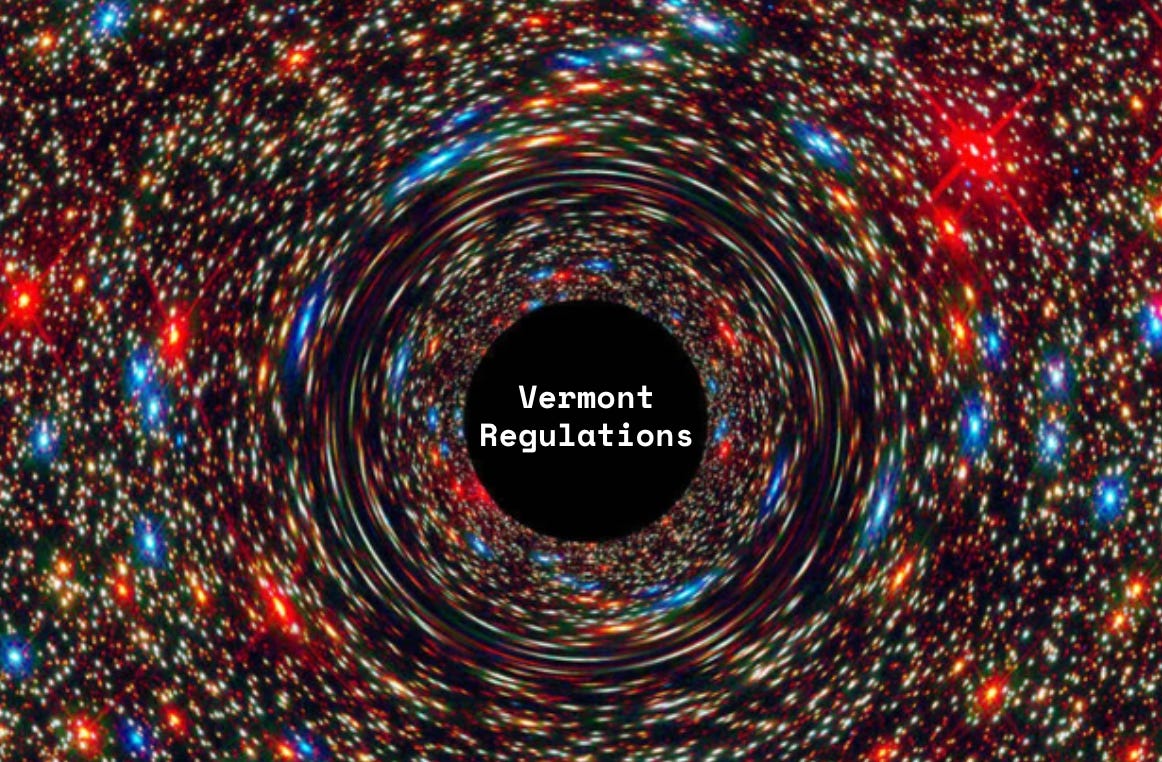The Act 250 of Cannabis Advertising: How Vermont's Regulators Once Held Ads Hostage, and What Changed
Before the settlement, the cannabis advertising rules, like Act 250 for home builders, speak to a shared experience of excessive expense, administrative burden, and uncertainty.
For years, Vermonters navigating the state’s iconic Act 250 land use permitting process have understood a particular flavor of bureaucratic purgatory: submit your application and wait indefinitely. Now, imagine that same agonizing uncertainty applied to something as mundane as promoting a weekly sale on social media. This was, until very recently, the reality for Vermont’s legal cannabis retailers. Their advertising regulations, described by some as “the Act 250 of cannabis marketing,” subjected every single ad, no matter how small, to a government pre-approval process with no end in sight.
This era of indefinite waiting, a unique burden not seen in any other Vermont industry, has finally come to an end thanks to a landmark settlement between FLŌRA Cannabis and the Vermont Cannabis Control Board (CCB). While the state’s core principle of pre-approval remains, the agreement has effectively dismantled the most frustrating aspect of this “submit and wait” system: the endless delay.
A System Built on Distrust, Leading to Paralysis
Vermont’s cannabis advertising laws, as codified in 7 V.S.A. § 864, were designed with an abundance of caution, a legislative legacy of deep public health concerns and a desire to avoid the aggressive commercialization seen in other states. Unlike other regulated products such as alcohol or even newly legalized sports gambling, cannabis advertisements were subjected to a regime of universal prior restraint. This meant the CCB had to sign off on every single ad before it could be seen by the public.
The critical flaw in this system, and the genesis of the FLŌRA lawsuit, was the glaring omission of a timeline. Before the settlement, there was no legally mandated deadline, a point repeatedly made by industry advocate Dave Silberman. This meant regulators could hold up an ad submission indefinitely. According to the lawsuit, this uncertainty made timely, responsive marketing for events like holiday promotions or new product arrivals a practical impossibility, creating a chilling effect on the industry’s ability to communicate with its customers.
This indefinite waiting period created a climate of regulatory paralysis, hindering businesses’ ability to innovate and compete. It also inadvertently benefited the unregulated illicit market, which faced no such advertising strictures.
The Lawsuit: Challenging the Indefinite Hold
Dave Silberman, co-founder of Middlebury’s FLŌRA Cannabis and a key architect of Vermont’s cannabis laws, emerged as the leading voice against this untenable system. His lawsuit, backed by the Vermont Cannabis Action Fund, directly challenged the constitutionality and practicality of these restrictions. While the suit touched on broader free speech arguments, the indefinite wait time was a potent example of the regulations being “more extensive than necessary” to achieve the state’s public health goals.
The industry argued that this “submit and wait indefinitely” model was unique to cannabis in Vermont and placed an unfair and unconstitutional burden on legal businesses. Indeed, no other industry or product in Vermont faced that same type of open-ended regulatory approval process for its advertising.
A “Shot Clock” to End the Waiting Game
The settlement, announced in September 2025, represents a significant victory against this bureaucratic bottleneck. While the core requirement for pre-approval remains, the indefinite waiting period is gone.
According to reporting from both VTDigger and Vermont Public, under the new terms, the Cannabis Control Board must now review advertisement submissions within five business days. Crucially, if the CCB fails to render a decision within that five-day window, the ad is automatically “deemed approved.” This “shot clock” introduces predictability and accountability, bringing cannabis advertising regulation closer to the norms of other regulated industries (though still more stringent in its prior approval mandate).
Silberman noted that while his ultimate goal is to eliminate pre-approval entirely, this change provides “immediate, meaningful relief,” according to an interview with VTDigger, and ensures that businesses can actually plan their marketing.
Moving Beyond Purgatory: What Comes Next
For cannabis retailers, the settlement marks a definitive end to the “Act 250 of advertising” era. They can now plan promotions, seasonal sales, and product launches with a clear understanding of the regulatory timeline. This will undoubtedly lead to more dynamic and competitive marketing efforts within Vermont’s legal cannabis market.
However, the fight, according to Silberman, is far from over. He sees the “shot clock” as a critical interim step, but not the final destination. The industry’s next lobbying push, slated for the 2026 legislative session, will target the complete elimination of the pre-approval requirement, arguing that cannabis should be treated like alcohol, where advertising rules are enforced post-publication, not pre-censorship.
The comparison to Act 250 resonates deeply because it speaks to a shared experience of administrative burden and uncertainty. While the indefinite wait for cannabis ads may be over, the underlying tension between strict state oversight and the commercial realities of a legal industry will continue to shape Vermont’s unique regulatory landscape for years to come. For now, however, cannabis businesses can breathe a sigh of relief: their ads, at least, will no longer be stuck in perpetual limbo.



